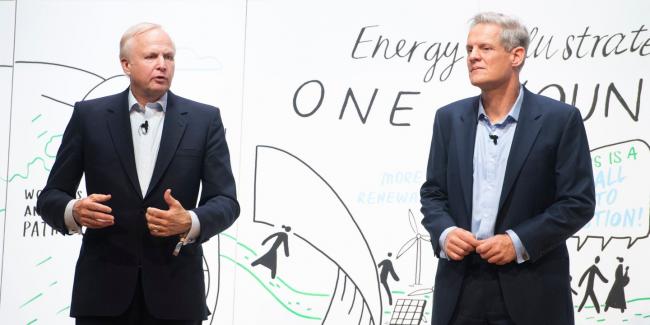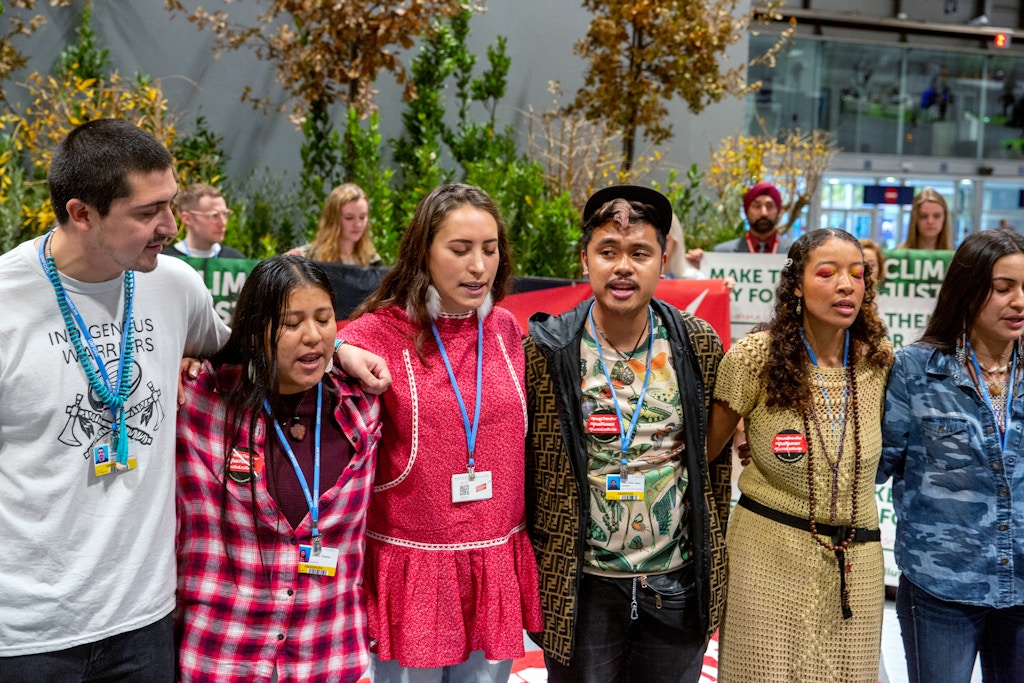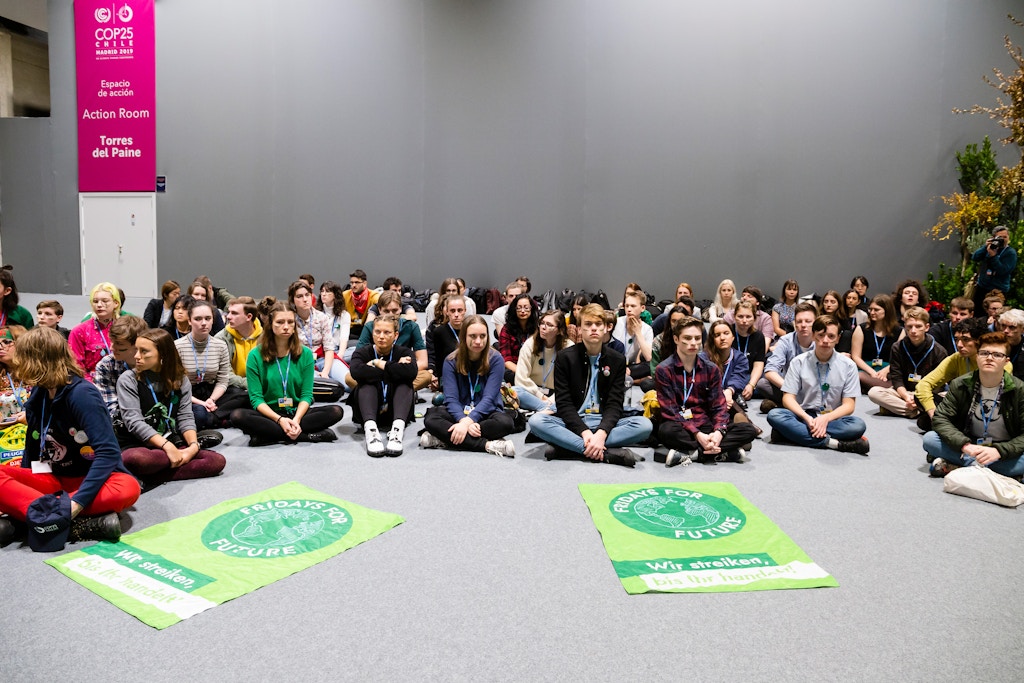Articles Menu

The same day that 16-year-old climate activist Greta Thunberg gave a stirring speech at the United Nations Climate Action Summit in September, in which she criticized delegates for “stealing my dreams and my childhood with your empty words,” the architects of the climate crisis welcomed select youth participants from the summit to dine.
CEOs from fossil fuel corporations including BP, Royal Dutch Shell, and Norway’s Equinor were attending the annual gathering of the Oil and Gas Climate Initiative in New York, which includes industry leaders who claim to be committed to taking “practical” action on climate change. On the agenda for lunch was to “explore options for long-term engagement” with young people the industry could trust. Student Energy, a nonprofit based in Alberta, near Canada’s tar sands region, helped organize the event, which included time for students to grill the CEOs about their inaction on climate change.
Tension in the room was high, Student Energy’s executive director, 30-year-old Meredith Adler, told The Intercept. “The whole discussion started off with one of our participants talking about why youth don’t trust oil and gas companies,” she said. But by the end of the meeting, Adler tweeted that she was “very impressed” with OGCI. “I don’t feel they had all the answers or strong enough answers but they are really listening,” she wrote.
The students’ questions may have been tough, but the event was great PR for the fossil fuel industry. Gone are the days when CEOs openly questioned the existence of climate change. Today, industry leaders are feigning a sense of climate urgency while pushing forward proposals for climate action that will allow companies to keep harvesting carbon-emitting products well into the future. Subjecting themselves to a cohort of skeptical students was an opportunity for oil and gas executives to boost their credibility in an era when many young activists will only engage with them with picket signs.
Young activists say they’re seeing more of this “youth-washing” as the global youth climate movement gains momentum, including at the U.N. annual climate conference, known as COP 25, which is wrapping up in Madrid this week. With “youth” becoming synonymous with climate action, corporations and politicians are increasingly using young people to portray themselves as climate serious.
“There’s a real dangerous tokenism of youth for the benefit of public image.”
“The use of youth in campaigning is becoming more and more overt,” said 24-year-old Eilidh Robb, a member of the U.K. Youth Climate Coalition, who has been involved in pushing the U.N. to adopt a conflict of interest policy that would prevent fossil fuel industry representatives from exercising influence at COP. “There’s a real dangerous tokenism of youth for the benefit of public image.”
The OGCI gathering was a particularly egregious example of youth-washing. OGCI has provided funding to Student Energy, and OGCI ventures director Rhea Hamilton is on the group’s board of directors. Among the “partners” listed in Student Energy’s 2018 annual report are Royal Dutch Shell and Suncor, one of Canada’s biggest tar sands producers. Fossil fuel companies consistently fund the organization’s annual conference.
Although Student Energy’s leaders often echo the talking points of activists like Thunberg, the group’s membership — a network it claims includes 40,000 young people — is largely made up of people who want to work in the energy industry.
Student Energy is among the youth groups granted observer status at COP 25, meaning that its members can gain access to negotiation spaces, speak with the negotiating parties, and participate in events. Its presence at the U.N.’s international climate talks is only expected to grow. Student Energy’s 2018 report noted that the group had seen a 73 percent increase in active chapters. Next year, the oil and gas major BP has pledged to send 50 Student Energy delegates to COP26. The funding would double the size of the group’s usual delegation, according to a BP press release. In a conference space that serves as a battleground of ideas about how to address the climate crisis, BP apparently sees Student Energy’s presence as beneficial to the corporation.
But Student Energy’s funders, some of the corporations most responsible for the climate crisis, show no signs of slowing down. Suncor’s production portfolio, which includes mostly tar sands extraction, is the most carbon intensive of the 100 largest fossil fuel companies in the world, and the company has pushed hard for new pipelines that would allow it to continue to increase production. Shell, the world’s 11th-largest greenhouse gas-emitting oil and gas company, is projected to increase its fossil fuel output by 38 percent by 2030. BP, the 14th-largest emitter, will up production by 20 percent.
The corporations’ projections fly in the face of the measures scientists say are required to meet the U.N.’s goal of cutting greenhouse gas emissions by 45 percent by 2030. The point of the COP is to move toward that goal.
Adler told The Intercept that Student Energy participated in the OGCI event in order to challenge the oil and gas industry face to face. She said the organization follows strict partnership principles that prevent funders from wielding influence over the group’s activities. A large proportion of the organization’s members want to work in the renewables industry, not for a fossil fuel company, she added, and next year they will be diversifying their funding sources significantly.
As for BP’s COP26 funding, Adler said that Student Energy has not officially accepted the money. “We’re examining what that looks like and the implications of that and if they’re the right partner.”
To Taylor Billings, a spokesperson for the nonprofit Corporate Accountability, it’s no surprise that the industry is seeking a youth movement to collaborate with. As she put it, “If zebras were leading the march, fossil fuel corporations and global north governments would be clambering to get into the zoo.”
The U.N. has done little to eliminate opportunities for youth-washing at its conferences. Since 2015, the international governing body has held an annual Global Youth Video Competition, in which participants submit short films highlighting climate action. The prize this year: a fully funded trip to COP 25.

But alongside several U.N. agencies sponsoring the project was the BNP Paribas Foundation, which is funded by a bank that spent more than $50 billion in fossil fuel investments between 2016 and 2018. In response, 29 climate organizations that work with young people sent a letter to the U.N. organizers of the project.
“This kind of corporate capture of a youth empowerment initiative is not only disappointing, but outright criminal,” the letter said, noting that BNP Paribas is the fifth-largest fossil fuel financier in Europe. The organizations called on the U.N. to “immediately terminate their partnership with BNP Paribas to ensure that youth engagement remains free from the influence of big polluters and their financiers.”
“Do not be responsible for the corruption of our courage and action,” the authors urged.
The U.N. dismissed the letter. “We share your views on the need to decarbonize the world and to that end also decarbonize investment portfolios of financial institutions as soon as possible,” said Niclas Svenningsen, the U.N.’s manager of Global Climate Action. However, he added, “We believe that it is also important to open the dialogue and look at how stakeholders from different sectors are transitioning their business models.”
To many, the response is typical. When it comes to youth-washing, “the biggest example and most egregious is the United Nations,” said Jonathan Palash-Mizner, the 17-year-old co-coordinator of Extinction Rebellion Youth U.S., who is attending COP 25. He said that youth spaces at the U.N. often feel like a “kids’ table,” with participants holding little decision-making power.
Meanwhile, “you go into any negotiation and every negotiator will invoke Greta Thunberg,” said Sarah Dobson, a 23-year-old member of the U.K. Youth Climate Coalition. “It’s embarrassing because they’re not going to live up to that vision.”

Dobson has been involved with a long-running youth effort to expel conflicts of interest from the COP. The official youth arm of the U.N., YOUNGO, bars its local chapters from entering partnerships with companies “that stand in conflict with the interests of young people.” The group has pushed for years for a policy that would keep anyone who has worked for a fossil fuel company out of future climate conferences and require disclosure of meetings between the fossil fuel industry and negotiating nations or U.N. officials.
They point to the World Health Organization’s Framework Convention on Tobacco Control, which states that parties “need to be alert to any efforts by the tobacco industry to undermine or subvert tobacco control efforts” and must protect the agreement from “commercial and other vested interests of the tobacco industry.”
YOUNGO argued again for a conflict of interest policy at a June U.N. gathering where COP logistics were discussed — but with the U.S., the European Union, and other global north delegates dismissive of the idea, they lost.
“Politicians and CEOs are making it look like real action is happening when in fact almost nothing is being done apart from clever accounting and creative PR.”
So, as COP 25 kicked off in Madrid last week, an array of representatives of the fossil fuel industry roamed the hallways alongside the negotiators who will decide the shape of the most important international climate agreement. Leaders from BP, Shell, Total, and Suncor all received accreditation to attend the conference via the industry-led International Emissions Trading Association, which has observer status. Other delegations invited representatives from Chevron, Petrobras, and other fossil fuel corporations. Meanwhile, among the sponsors of COP 25 was the utility company Endesa, the largest carbon emitter in Spain.
The fossil fuel industry has attempted to obstruct a strong climate agreement since the U.N. began negotiating the issue in the 1990s. This year, industry trade associations weighed in most heavily on a section of the agreement known as Article 6, which includes rules for emissions trading schemes. Overall, international carbon trading systems have failed to significantly reduce emissions where they’ve been implemented. Instead of simply forcing cuts via regulations, the markets allow companies to invest in climate offset projects that, in many cases, have been found to have little genuine climate impact.
The shape of the markets will make a huge difference in how much the fossil fuel industry will have to pay. At the COP, as Dobson put it, “Corporations are literally everywhere.”
Youth-washing has proliferated beyond the U.N.’s climate gatherings.
Robb pointed to Canadian Prime Minister Justin Trudeau’s meeting with Thunberg in September, held before he participated in a youth-led Fridays for Future march, where he was heckled by Canadians who labeled him a climate criminal. Trudeau has tried hard to frame himself as serious about the climate, but last year his government purchased Kinder Morgan’s proposed Trans Mountain pipeline, a highly contested and carbon-intensive project key to keeping Canada’s tar sands industry profitable.
 Canadian Prime Minister Justin Trudeau speaks to Swedish environmental activist Greta Thunberg in Montreal on Sept. 27, 2019.
Canadian Prime Minister Justin Trudeau speaks to Swedish environmental activist Greta Thunberg in Montreal on Sept. 27, 2019.Of course, the most disturbing examples of youth-washing involve the fossil fuel industry. This year, BP sponsored the annual One Young World conference, sometimes referred to as “Young Davos,” and paid for 30 students focused on low-carbon energy issues to attend. At the October event, BP’s CEO and its chief economist took turns on stage. “But hang on — I’m chief economist at BP, one of the world’s largest oil and gas companies. What’s BP doing here? Aren’t we part of the problem? Now, I truly believe we’re not,” the economist, Spencer Dale, pitched the audience. “Companies like BP can be, and indeed need to be, part of the solution.”
And Shell has launched a #MaketheFuture campaign, suggesting that it’s building a better future rather than destroying it. The campaign promotes Shell as a driver of low-carbon technology and features images of young people as well as social media posts about the company’s funding of youth engineering and science programs.
Even the far-right CO2 Coalition, funded by the Kochs’ fossil fuel money and led by former Trump advisers who claim that CO2 emissions are good for the earth, is attempting to recruit young people. After struggling to attract support from young Republican staffers, the group has reportedly sought out students on college campuses in an attempt to “reach them a little earlier.”
“They have pretty much endless money to go out and try to move whichever constituency is most resistant to their agenda,” said 26-year-old Julian Brave NoiseCat, vice president of the progressive think tank Data for Progress.
Indeed, the tar sands giant Suncor was also the “founding partner” of Student Energy’s first Indigenous Student Energy Summit, held last January — an opportunity for the company to reach two demographics associated with fossil fuel resistance at once. Other funders of the Indigenous youth conference included Enbridge, TC Energy, and LNG Canada, all of which stand to profit from tar sands pipelines that have been halted by Indigenous-led coalitions.
Adler said that, until recently, it was primarily the fossil fuel industry that showed interest in funding the group’s programming. “The reality is there were very few types of organizations that were interested in youth until about a year ago,” she said.
As COP 25 wound down, with key issues unresolved, Thunberg was named Time magazine’s Person of the Year. In a speech at the U.N. the same day, she referenced the way corporations and politicians have co-opted her words. “Those phrases are all that people focus on. They don’t remember the facts, the very reasons why I say those things in the first place,” she said. “I still believe that the biggest danger is not inaction — the real danger is when politicians and CEOs are making it look like real action is happening when, in fact, almost nothing is being done apart from clever accounting and creative PR.”
What’s at stake, said Dobson, is the watering down of a forceful youth movement. “For corporations to take our images, to take the symbols of our movement and use them to validate their own activities completely disrespects the effort we put into building this grassroots movement,” she said. “It gives the illusion that the youth have sold out their values to support the activities of horrible businesses.”
[Top photo: BP CEO Bob Dudley, left, and chief economist Spencer Dale speak during a session at the One Young World Summit in London on Oct. 23, 2019. Photo: Facundo Arrizabalaga/EPA-EFE/Shutterstock]